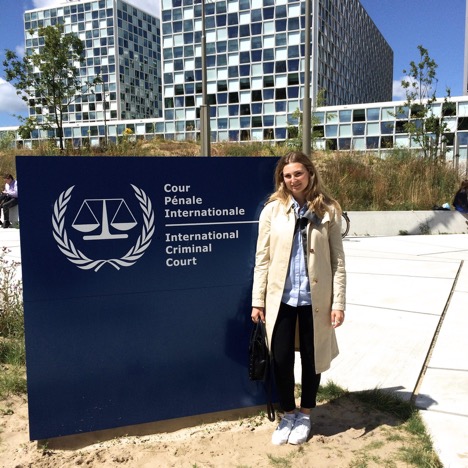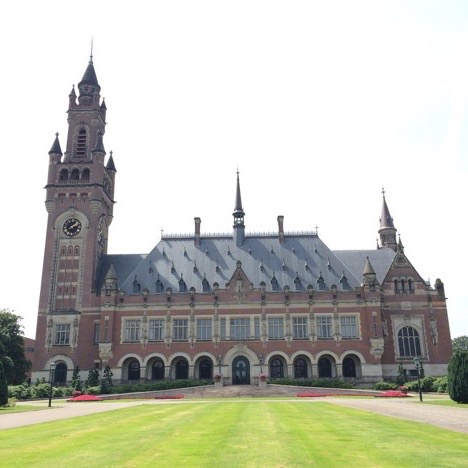Secondary menu
Summer Experiences: The Hague Academy of International Law
January 20, 2017
Sarah Firestone (1L)

Sarah Firestone in front of the International Criminal Court
On my first day in The Hague, I walked through the indescribably grand gates of the Neo-Renaissance Carnegie Peace Palace and into The Hague Academy of International Law. Only a few feet away in the same building, the tribunal at the Permanent Court of Arbitration released its decision rejecting Beijing’s claims to the disputed waters in the South China Sea—one of the most contentious issues in East Asia. This made for an exciting start to my summer experience.
The Hague Academy of International Law has been offering summer courses on Public and Private International Law since its inception in 1923. I had the privilege of being one of the program’s attendees this past summer. It was an incredible opportunity to meet, learn from, and study alongside law students, graduate students, lawyers, and judges sharing a passion for international law—and all in The Hague, the international city of peace and justice.
The program comprises a series of courses, lectures, and visits to international tribunals, organizations, and embassies. The courses differ each year and are taught by international judges and professors. This past year, the general course, “International Law: Between Letter and Spirit,” was taught by Justice Mohamed Bennouna of the International Court of Justice (ICJ). With an emphasis on case law, this course examined foundational international law concepts and their philosophical and historical underpinnings; it also looked at international law’s function in current society.
The other courses shifted weekly. They included “Human Dignity”; “International Case Law in the Development of International Law”; “International Law Relating to Islands” (focused on disputes regarding the law of the sea); “International Organizations and their Operations Actions for State Reconstruction”; “Shared Responsibility in International Law”; and “The Prohibition of Torture in Contemporary International Law.” I particularly enjoyed the variety in the course material, which allowed me to gain insights into very different aspects of international law and to hear from professors from universities all over the world.
The program also included guest lectures by professionals in the field, which put our learning into a practical context. I thoroughly enjoyed hearing American Justice Joan E. Donoghue of the ICJ speak eloquently about her career as a woman in the US Department of State and her current role on the Court. She was hopeful about a bright future for women in leadership roles in international institutions as well as in foreign affairs more generally. This was very encouraging for the aspiring female international lawyers in attendance.
Additionally, program participants had the chance to visit international institutions and watch them in action. In what was actually my first time sitting in on a court proceeding, I went to the Special Tribunal for Lebanon; it is currently trying (in absentia, civil law style) those accused of carrying out an attack on 14 February 2005 that killed twenty-two people, including the former Prime Minister of Lebanon. I also attended the trial of Bosco Ntaganda—the alleged Deputy Chief of Staff and Commander of Operations of the Patriotic Forces for the Liberation of Congo (FPLC)—at the International Criminal Court. He faces several charges, including thirteen counts of war crimes and five counts of crimes against humanity in the Democratic Republic of Congo. The feeling of sitting in the room was ineffable, and I was reminded exactly why I wanted to pursue a legal career.

The Peace Palace and its grounds. Photography by Sarah Firestone.
Invitations to go on Embassy visits were another one of the program’s perks. Ambassador Sabine Nolke welcomed myself, along with the other Canadian students, to the Embassy of Canada to the Netherlands. In addition to being the Canadian Ambassador, Ms. Nolke is the Permanent Representative to the Organisation for the Prohibition of Chemical Weapons, as well as the representative of Canada’s interests before the international courts and legal institutions in The Hague. She shared pieces of advice and experience from her career in international law from a Canadian’s perspective, and spoke particularly about potential careers in international law for Canadian women. It was a talk I found to be incredibly valuable.
Last but certainly not least, my time in The Hague gave me the chance to make new friends from all around the world, and to explore my host nation. On the weekends, I managed to travel around the Netherlands, paying visits to Amsterdam, Leiden, Utrecht, and Delft. In my free time, I got to frequent Scheveningen (sometimes referred to as “The Hague Beach”), a beachside district only a few minutes away from my classrooms by bike—the ubiquitous Dutch mode of transport. I also got to eat a little too much cheese, take out books from the venerable Peace Palace Library, pick up some Delftware (blue and white pottery), overload on Dutch ice cream, see the some of the best works by the Dutch Masters, and do some requisite cycling.
The entire summer was a truly unique opportunity: it allowed me to gain a comprehensive understanding of the subject of international law and its function alongside similarly passionate peers, and in the capital city of international law, no less. The whole experience helped me navigate the nuances of international law and shed light on the extremely divergent paths and career possibilities within it. Ultimately, it did much to shape my legal interests. When I applied to U of T Law, I knew I wanted to pursue a career in this area of the law. I ended up choosing to come here because of the international law opportunities it provides, including the International Human Rights Program. I am thrilled to be here and able to take part in them.
If anyone is interested, I would be happy to talk more about my experience or answer any questions about the application process. Feel free to email me at: sarah.firestone@mail.utoronto.ca
